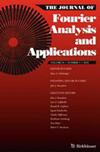$${\mathbb {Z}}$$, $${\mathbb {Z}}_d$$和上STFT相位反演的注入性条件 $${{\mathbb {R}}}^d$$
IF 1.2
3区 数学
Q2 MATHEMATICS, APPLIED
引用次数: 0
摘要
摘要研究了$${\mathbb {Z}}$$ Z、$${\mathbb {Z}}_d$$ Z d和$${{\mathbb {R}}}^d$$ R d群上短时傅里叶变换的相位恢复问题。众所周知,一旦窗口的模糊函数消失,相位恢复是可能的。然而,对于不满足此条件的窗口,只有少数结果。本文的目标是用更一般的窗口建立新的和完整的相位检索表征,并将它们与现有的结果进行比较。对于一个固定的窗口,我们的唯一性条件通常只依赖于信号的支持,因此很容易理解。在离散设置中,我们还提供了一些例子,表明非消失模糊函数对于窗口进行相位检索是不必要的。本文章由计算机程序翻译,如有差异,请以英文原文为准。
Injectivity Conditions for STFT Phase Retrieval on $${\mathbb {Z}}$$, $${\mathbb {Z}}_d$$ and $${{\mathbb {R}}}^d$$
Abstract We study the phase retrieval problem for the short-time Fourier transform on the groups $${\mathbb {Z}}$$ Z , $${\mathbb {Z}}_d$$ Z d and $${{\mathbb {R}}}^d$$ R d . As is well-known, phase retrieval is possible once the windows’s ambiguity function vanishes nowhere. However, there are only few results for windows that fail to meet this condition. The goal of this paper is to establish new and complete characterizations for phase retrieval with more general windows and compare them to existing results. For a fixed window, our uniqueness conditions usually only depend on the signal’s support and are therefore easily comprehensible. In the discrete settings, we also provide examples which show that a non-vanishing ambiguity function is not necessary for a window to do phase retrieval.
求助全文
通过发布文献求助,成功后即可免费获取论文全文。
去求助
来源期刊
CiteScore
2.10
自引率
16.70%
发文量
72
审稿时长
6-12 weeks
期刊介绍:
The Journal of Fourier Analysis and Applications will publish results in Fourier analysis, as well as applicable mathematics having a significant Fourier analytic component. Appropriate manuscripts at the highest research level will be accepted for publication. Because of the extensive, intricate, and fundamental relationship between Fourier analysis and so many other subjects, selected and readable surveys will also be published. These surveys will include historical articles, research tutorials, and expositions of specific topics.
TheJournal of Fourier Analysis and Applications will provide a perspective and means for centralizing and disseminating new information from the vantage point of Fourier analysis. The breadth of Fourier analysis and diversity of its applicability require that each paper should contain a clear and motivated introduction, which is accessible to all of our readers.
Areas of applications include the following:
antenna theory * crystallography * fast algorithms * Gabor theory and applications * image processing * number theory * optics * partial differential equations * prediction theory * radar applications * sampling theory * spectral estimation * speech processing * stochastic processes * time-frequency analysis * time series * tomography * turbulence * uncertainty principles * wavelet theory and applications

 求助内容:
求助内容: 应助结果提醒方式:
应助结果提醒方式:


